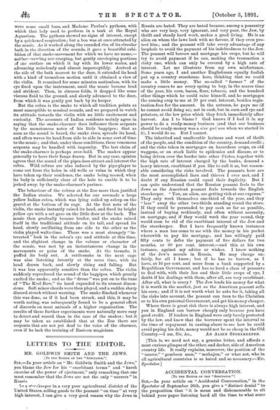LETTERS TO THE EDITOR.
MR. GOLD WIN SMITH AND THE JEWS.
[TO THE EDITOR 07 THE "SPECTATOR."]
SIR,—In your article on "Mr. Goldwin Smith and the Jews," you blame the Jew for his "exorbitant terms" and "harsh exercise of the power of ejectment," only remarking that one must remember that the Jews are not the only " usurers " in Russia
a stfrekeeper in a very poor agricultural district of the United States, selling goods to the peasant "on time" at very high interest, I can give a very good reason why the Jews in
Russia are hated. They are hated because, among a peasantry who are very lazy, very ignorant, and very poor, the Jew, by thrift and steady hard work, makes a good living. He is an alien on whom the laws look with no favour, if they even pro- tect him; and the peasant will take every advantage of any loophole to avoid the payment of his indebtedness to the Jew.. The peasant will borrow and mortgage his crops, but he will try to avoid payment if he can, making the transaction a risky one,. which can only be covered by a high rate of interest. Let me illustrate from my own misfortunes.. Some years ago, I and another Englishman equally foolish put up a country storehouse here, thinking that we could make a little money. The so-called " farmer " of the- country comes to me every spring to buy, in the scarce time- of the year, his corn, bacon, flour, tobacco, and the hundred other things which he could raise himself, and he mortgages the coming crop to me at 20 per cent. interest, besides regis- tration-fees for the amount. In the autumn, he pays me (if he cannot avoid doing so), not in cash, but in corn and rye and potatoes, at the low price which they fetch immediately after harvest. Am I to blame P God knows if I had it in my power to do a ready-money business (and that our business. should be ready-money was a sine qua' non when we started in it), I would do so. But I cannot.
The inherited and unalterable laziness and want of thrift of the people, and the condition of the country, demand credit ;. and the risks taken in mortgages on hazardous crops, on old• waggons, or on stock liable to epidemics and disease, or to. being driven over the border into other states, together with. the high rate of interest charged by the banks, demand a heavy interest, exorbitant if you like to call it so, but reason- able considering the risks involved. The peasants here are- the most accomplished liars and thieves I ever met, and I doubt if any Russian could equal their duplicity. But I can quite understand that the Russian peasant feels to the Jews as the American peasant feels towards the English storekeeper. "You, an alien, are getting rich at our expense." They only work themselves one-third of the year, and they- " laze " away the other two-thirds standing round the store. If they could be persuaded to pay cash as far as possible,. instead of buying recklessly, and often without necessity,. on mortgage, and if they would work the year round, they would soon be rid of the exorbitant interest of the Jew and the storekeeper. But I have frequently known instances- where a man has come to me with the money in his pocket wherewith to pay his mortgage, and has willingly paid fifty cents to defer the payment of five dollars for two- months, or 60 per cent. interest,—and this at his own instance, against my advice or wishes. I know nothing of the Jew's morals in Russia. He may charge un- fairly, for all I know; but if he has to borrow, as I have, at 16 per cent. and more from a bank supported by a Republican Government, and has as hard a class of peasants.. to deal with, with their lies and their little crops of rye, I doubt if his dealings with them, after all, are very exorbitant. Afterall, what is usury ? The Jew lends his money for what it is worth in the market, just as the American peasant sells. his corn ; and if it is not worth what he asks for it, taking all the risks into account, the peasant can turn to the Christian or to his own paternal Government, and get his money cheaper..
Where there is great risk there is always high interest, and you in England can borrow cheaply only because you have good credit. If lenders in England were only barely protected by the law, and knew that the borrower spent the interval to the time of repayment in casting about to see how he could avoid paying his debt, money would not be so cheap in the Old, [This is, we need not say, a genuine letter, and affords a most curious glimpse of the other, and darker, side of American country life. It really explains, moreover, the position of the "usurer," " gombeen man," " muhajun," or what not, who in all agricultural countries is so hated and so necessary.—En. Spectator.]


































 Previous page
Previous page